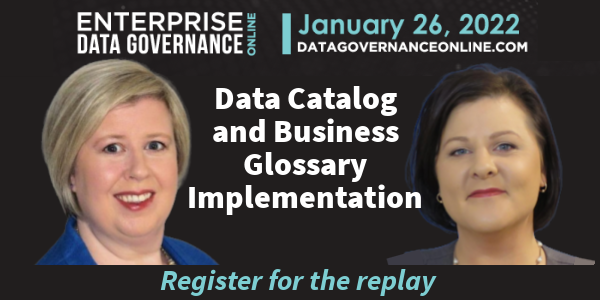Last month, FSFP’s Gretchen Burnham and Becky Lyons presented at Enterprise Data Governance Online (EDGO). As a preview of Becky and Gretchen’s upcoming new training with DATAVERSITY, they spoke on implementing a data catalog and business glossary.
Read on for a recap of their informative session.
Optimize Your Data Catalog
Investing in a data catalog tool to understand your data and extract its full value is a great first step, but a data catalog is only as important as its use. Data governance is needed for a data catalog to be useful. It leads to decisions about the right content and how to make decisions around that content.
Metadata is also foundational to data work and overall data strategy. The symbiotic relationship between data governance and metadata manifests itself when it comes to data governance programs. Metadata is foundational for data governance, and you can’t do metadata without data governance. Data governance leads to metadata with context that your organization can stand behind, capturing metadata and governance decisions.

Register for access to Gretchen and Becky’s presentation and sessions from EDGO’s other speakers.
Identify Business Value
When implementing a data catalog, identify one specific business issue or need to address. Begin by looking at high-level issues, break them down and find specific things to achieve from a governance or metadata perspective to drive business value. Fixing the first, easier-to-solve business issue will be an early achievement, and you can leverage the success to solve the next issue.
Data catalogs are different from other tools because of their structure and how they function. You need to have a consistent view over how your data catalog will be structured. It is critical for users to adopt the tool and have the right level of control over the structure to ensure consistency. Content must go into a consistent structure so users can understand what content to bring in and when to build roadmaps and provide business value.
Access the Recording
Gretchen and Becky covered more during their EDGO session, including how to empower data catalog users and how resistance to a big change, such as implementing a new data catalog, is to be expected — and what your organization can do about those obstacles.
If you couldn’t join EDGO, you can still register to get access to the recorded online sessions. Sign up to listen in to the full day of events, including the six sessions covering data governance, data quality and more.

